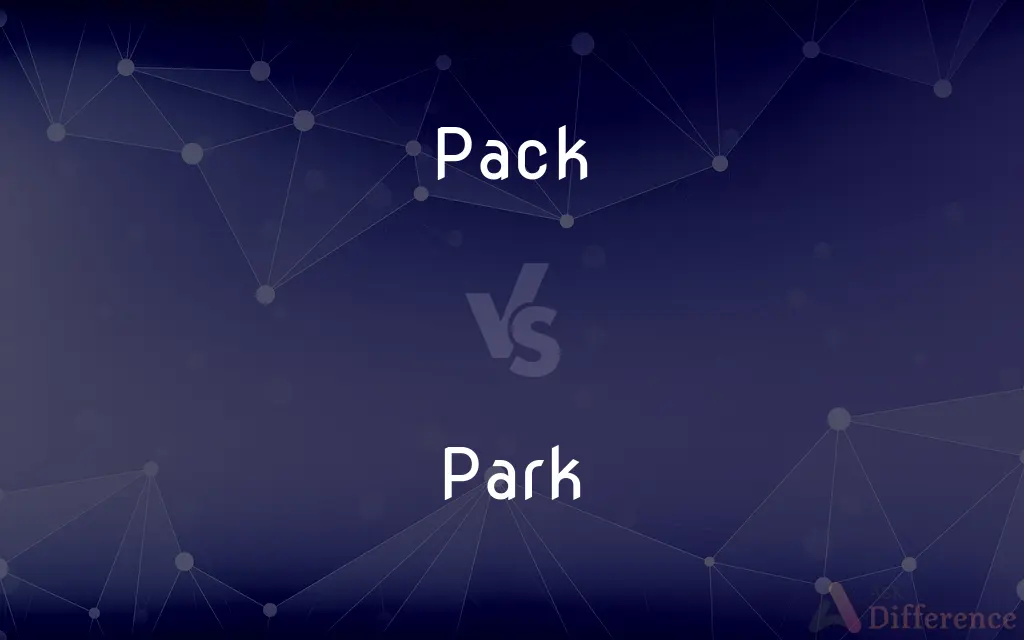Pack vs. Park — What's the Difference?
Edited by Tayyaba Rehman — By Urooj Arif — Updated on March 1, 2024
Pack refers to a collection of items grouped together or the act of arranging items into a container, while park refers to a public green space for recreation or the act of placing a vehicle in a designated spot.

Difference Between Pack and Park
Table of Contents
ADVERTISEMENT
Key Differences
Pack, as a noun, describes a group of items or belongings that are placed together, such as in a backpack for traveling, or it can refer to a group of animals, like wolves, that live and hunt together. Park, in contrast, primarily denotes an area of natural, semi-natural, or planted space set aside for human enjoyment and recreation or for the protection of wildlife or natural habitats. Urban parks are green spaces within cities for public use, while national parks protect natural landscapes and wildlife.
Pack involves the action of arranging and securing items into containers or spaces, ensuring they are organized for transport or storage. The term emphasizes the organization and consolidation of objects or entities. As a verb, park means to leave a vehicle in a designated location for a temporary period. It focuses on the allocation of space for vehicles or the designation of areas for public or environmental purposes.
The difference between the two concepts lies in their application and context. Packing is an activity related to preparation and organization, often associated with travel, storage, or the behavior of animals. Parking relates to the use and designation of spaces, either for the enjoyment and conservation of nature or for the temporary storage of vehicles. Both terms share a commonality in organizing and allocating space, but they do so in markedly different contexts and with different purposes.
Pack involves a deliberate action to compile and secure, requiring consideration of space, efficiency, and the protection of items or cohesion among members (in the case of animals). Park involves the designation or use of space for specific purposes, whether for the enjoyment of nature, the conservation of the environment, or the practicalities of vehicle storage.
"Pack" is associated with preparation and mobility, "park" is tied to location and placement. The act of packing prepares for movement or travel, whereas parking involves temporarily halting movement, either of oneself in a natural setting or of a vehicle in an urban or designated environment.
ADVERTISEMENT
Comparison Chart
Definition (Noun)
A collection of items grouped together; a group of animals.
A public green space for recreation; a designated area for vehicle storage.
Definition (Verb)
To arrange items into a container or space.
To place a vehicle in a designated spot; to allocate space for public or environmental use.
Contexts
Travel, storage, animal behavior.
Urban planning, recreation, vehicle storage.
Purpose
Organization, preparation, cohesion.
Enjoyment, conservation, designation.
Key Features
Efficiency, space utilization, protection.
Accessibility, enjoyment, environmental protection.
Compare with Definitions
Pack
A group of animals that live and hunt together.
A pack of wolves was spotted near the forest edge.
Park
A large public green area for recreation.
We had a picnic in the park on Sunday.
Pack
To fill a container with items systematically.
He packed his suitcase the night before departure.
Park
An area designated for specific purposes, such as conservation.
Yellowstone is the first national park in the U.S.
Pack
The act of compressing material into a confined space.
Pack the soil around the plant roots firmly.
Park
The act of arranging vehicles or objects in a specific area.
Trucks are parked at the loading dock.
Pack
A collection of items arranged for transport or storage.
She prepared a pack for her hiking trip.
Park
To leave a vehicle in a designated area.
She parked her car in the downtown lot.
Pack
A bundle or package of goods.
A pack of gum was all he bought.
Park
A recreational or sports facility.
The skate park is popular among teenagers.
Pack
A collection of items tied up or wrapped; a bundle.
Park
A park is an area of natural, semi-natural or planted space set aside for human enjoyment and recreation or for the protection of wildlife or natural habitats. Urban parks are green spaces set aside for recreation inside towns and cities.
Pack
A container made to be carried on the body of a person or animal.
Park
A piece of land with few or no buildings within or adjoining a town, maintained for recreational and ornamental purposes.
Pack
A mass of large pieces of floating ice driven together.
Park
A landscaped city square.
Pack
Material, such as towels, sheets, or blankets that are used to swathe a patient or body part.
Park
A large tract of rural land kept in its natural state and usually reserved for the enjoyment and recreation of visitors.
Pack
A material, such as gauze, that is therapeutically inserted into a body cavity or wound.
Park
A broad, fairly level valley between mountain ranges
The high parks of the Rocky Mountains.
Pack
A number or quantity equal to the contents of a pack; hence, a multitude; a burden.
Park
A lot where cars are parked
Pack
A group or quantity of connected or similar things; as, a pack of lies
Park
Place temporarily;
Park the car in the yard
Park the children with the in-laws
Park your bag in this locker
Pack
A large area of floating pieces of ice driven together more or less closely.
Pack
An envelope, or wrapping, of sheets used in hydropathic practice, called dry pack, wet pack, cold pack, etc., according to the method of treatment.
Pack
Load with a pack
Common Curiosities
Can the term "park" apply to areas other than green spaces?
Yes, "park" can also refer to industrial parks, business parks, or other designated areas for specific purposes beyond green recreational spaces.
What makes a park different from a garden?
Parks are usually larger public spaces that can include a variety of natural landscapes and recreational facilities, while gardens are more focused on the cultivation and display of plants and flowers.
What is the primary purpose of packing?
The primary purpose of packing is to organize and secure items for transport, storage, or efficient use, ensuring protection and accessibility.
What legal considerations exist for parking in urban areas?
Legal considerations for parking may include regulations on parking zones, time limits, fees, and permits to ensure orderly use of space and access.
How do parks contribute to urban environments?
Parks enhance urban environments by providing green space for recreation, improving air quality, supporting biodiversity, and offering a respite from the urban landscape.
How does animal packing behavior differ from human packing?
Animal packing behavior refers to the social structure and hunting strategies of groups, like wolves, whereas human packing involves the deliberate arrangement of items for practical purposes.
Is packing only related to physical items?
While commonly associated with physical items, packing can also metaphorically apply to the organization of ideas or information.
Can packing be environmentally sustainable?
Yes, sustainable packing involves using eco-friendly materials, minimizing waste, and optimizing space to reduce the environmental impact.
What are the challenges of packing efficiently?
Challenges include optimizing space, protecting items, considering weight distribution, and ensuring easy access to essentials.
How has the concept of parking evolved with technology?
Technology has introduced smart parking solutions, electronic payment systems, and apps to improve the efficiency and convenience of finding and using parking spaces.
Share Your Discovery

Previous Comparison
Classic vs. Classy
Next Comparison
Style vs. GenreAuthor Spotlight
Written by
Urooj ArifUrooj is a skilled content writer at Ask Difference, known for her exceptional ability to simplify complex topics into engaging and informative content. With a passion for research and a flair for clear, concise writing, she consistently delivers articles that resonate with our diverse audience.
Edited by
Tayyaba RehmanTayyaba Rehman is a distinguished writer, currently serving as a primary contributor to askdifference.com. As a researcher in semantics and etymology, Tayyaba's passion for the complexity of languages and their distinctions has found a perfect home on the platform. Tayyaba delves into the intricacies of language, distinguishing between commonly confused words and phrases, thereby providing clarity for readers worldwide.
















































